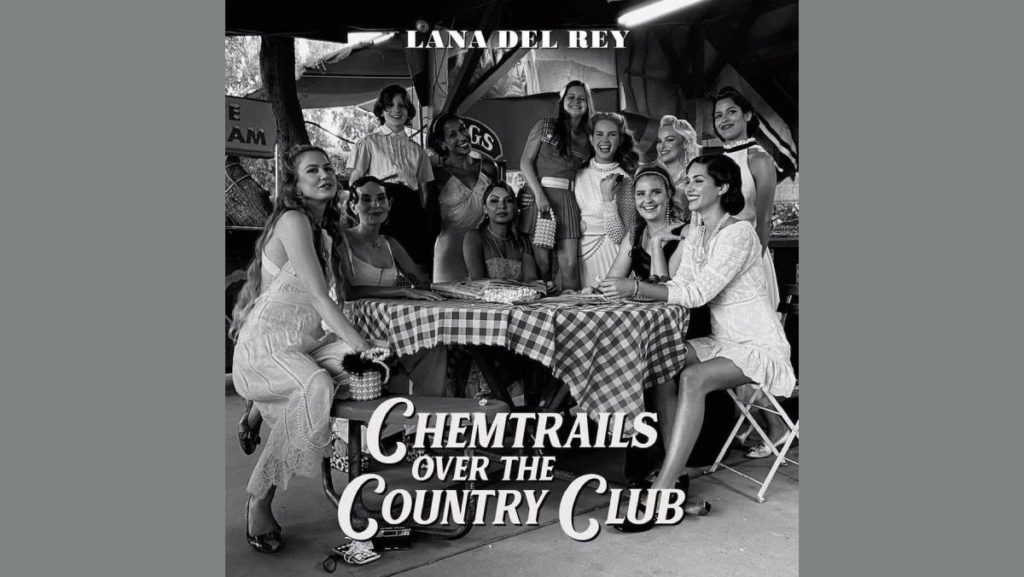Lana Del Rey is back, and she’s cooler than ever. The singer-songwriter returns to music less than a year later after the publication of her debut poetry book, “Violet Bent Backwards Over the Grass.” Reunited with frequent collaborator and producer Jack Antonoff, Del Rey’s seventh studio album “Chemtrails Over the Country Club” offers a mix of introspection and escapism. Throughout the album, Del Rey discusses fame and its burden.
“Tulsa Jesus Freak” and “Wild at Heart” are the most memorable tracks. “Tulsa Jesus Freak” creates a fascinating contrast between physical love and religious motifs: “Find your way back to my bed again / Sing me like a bible hymn.” Del Rey’s vocals are sprinkled with a touch of autotune. However, instead of being distracting, the autotune benefits the relaxed instrumentals. At the end of the track, Del Rey’s vocals echo like an angelic choir, fitting with the theme.
In “Wild at Heart,” Del Rey expresses self-love and freedom. Accompanied only by a soft electric guitar and tambourine, her vocals truly shine. Whether it’s a sensual serenade or personal anthem, Del Rey does a wonderful job at storytelling.
Del Rey’s iconic storytelling comes to play in the title track, “Chemtrails Over the Country Club,” which introduces a dazzling dreamscape. The vocals are layered to have an alluring, yet serene sound. These are perfectly mixed with a piano, drums and plucking strings. Most compelling are the strong visuals the lyrics create as Del Rey sings about summer memories: “We’re in our jewels in the swimming pool / Me and my sister just playin’ it cool.”
In “White Dress,” Del Rey reminiscences about her life before fame and wonders if achieving stardom was worth it. A piano, a common instrumental used throughout “Chemtrails,” plays powerfully. Unlike the other songs on the album, Del Rey experiments with her vocals. The other tracks have more tranquil vocals, but here she sings in a high, whispery voice in the chorus. While the effort is appreciated, she ends up sounding strained on certain notes. Instead of being ear-catching like the autotune in “Tulsa,” the sudden change in pitch is abrupt. Because of this, Del Rey’s intimate narrative of where she started as a musician goes astray.
Del Rey is not afraid to comment on the underbelly of Hollywood and the music industry. “Dark But Just a Game” was inspired by an unfortunate encounter Del Rey had at an Oscars After Party. The artist recounted how it unfolded in an interview for MOJO Magazine, saying, “Something happened, kind of situation like — never meet your idols, … I thought to myself, ‘I’m going to try my best not to change because I love who I am.’” Throughout the song, she expresses that fame is not worth it, with lyrics like, “No rose left on the vines / Don’t even want what’s mine.” She vows to remain true to herself, an empowering sentiment. At the end of the song, Del Rey leaves the last lyric unfinished, “It’s dark, but just—,” leaving off on a gloomy tone. Fame is not a game — it’s just dark.
The album closes out with “For Free (ft. Zella Day and Weyes Blood),” a cover of the 1970 Joni Mitchell’s song of the same name. A beautiful piano begins the track and continues its graceful melody throughout as each artist sings a verse. While the cover sounds similar to the original, it is done gorgeously, concluding the album on a hopeful note.
For those who enjoyed Del Rey’s 2019’s “Norman F—— Rockwell!,” “Chemtrails Over the Country Club” feels like a welcomed continuation. Like her other music, “Chemtrails” contains the usual Del Rey aesthetics: Old Americana, classic rock n’ roll and learning how to love oneself. The singer-songwriter always finds new ways to expand on these concepts. While this album explores darker themes, Del Rey reveals raw emotion and talent.




















